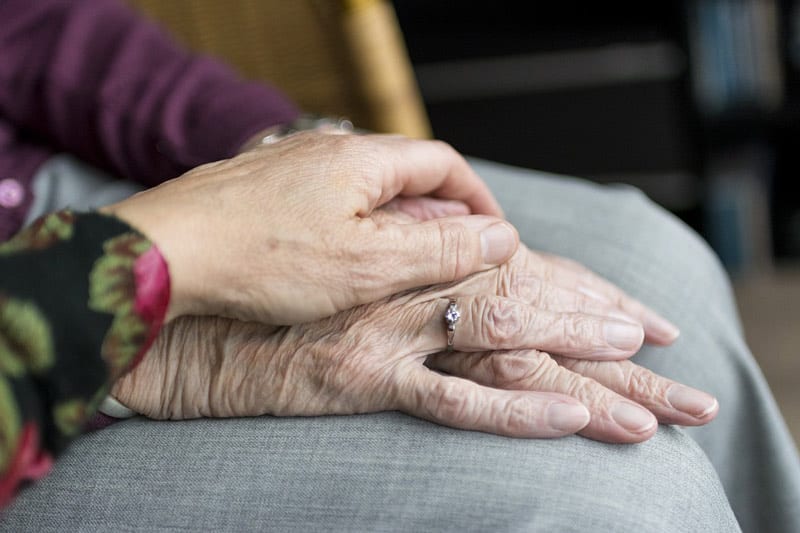Most seniors don’t seek treatment or even help because they view their mental changes as a natural part of aging or partly because they are ashamed of their condition. While it’s normal for elderly people to experience some level of forgetfulness, it’s important to seek professional help if they show obvious changes in behavior or mood.
A significant number of elderly people experience one or more mental health disorders, such as depression, anxiety, dementia, and bipolar disorder. This, together with the natural physical and cognitive impairments that occur in old age, can endanger their lives. Here’s how you can care for elderly parents with mental health issues:
Have a Conversation
Bringing up the topic of long-term senior care can be difficult. To mom or dad, accepting this type of care may seem like giving up their independence. The topic is even more fraught if they have a mental illness.
As a caregiver, you are worried about how to approach the subject without upsetting them, or worse, receiving an irrational or violent reaction. Here are a few tips to help you start such a tough discussion:
- Choose a time when both of you are calm.
- Expect some form of resistance and don’t take any outbursts personally. Remember, they are also afraid of the unknown and any threats or emotional outbursts from your side will only add anxiety and even cause them to shut down communication.
- If you don’t succeed the first time, try again.
Schedule a Doctor’s Visit
The next step when caring for aging parents with mental illness is encouraging them to see a doctor. The doctor will give a diagnosis and prescribe medication that will help alleviate symptoms of the disorder. Remember to set up a therapist appointment as well. A good therapist will help your parents identify and learn how to cope with some of the underlying issues that may be causing their mental health issues.
Ensure Effective Communication
As a caregiver to aging parents with mental illness, you’ll have to communicate with many people, including their friends, other family members, healthcare professionals, etc.
Family members may want regular updates on a parent’s condition while the parent wants more privacy. It’s your job to manage these interactions effectively and keep them as stress-free as possible.
Gather As Much Information about the Illness as Possible
It’s important to do some research on the type of mental health problem an elderly parent is experiencing, not forgetting the different kinds of treatment available. Such information can be found on reputable websites such as health organizations or government sites.
You can also talk to the doctor and others who’ve cared for a loved one in a similar situation. In addition, find out about any online or local mental health assistance programs that can help you. All this information will help you figure out the types of emotional, practical, and financial support your parent might need.
Ensure They Take Their Medications as Prescribed
This will help treat the illness or alleviate symptoms. Be sure to know what medications have been prescribed, their potential side effects, as well as any interactions with other drugs the patient is taking, as well as food, supplements, and other substances.
Complete the Necessary Paperwork
Some mental health disorders, together with age-related illnesses, can pose unique challenges. They can cause aging parents to be of unsound mind, or be a danger to themselves or others. In such cases, you may need a power of attorney to make decisions, including medical ones, on their behalf.
Give Them Some Level of Control
Taking care of your parents when they are old is a great thing to do, but it can leave them feeling dependent and worthlessness. It’s important to keep them involved in their own care decisions, which in turn helps them feel more comfortable when it comes to taking a new step into their treatment.
Find Much Needed Support
Taking care of elderly parents can be overwhelming. Caregiver support is essential to anyone coping with the demands of taking care of aging parents. It’s also important for your parents to seek mental health support specifically intended for older people, as it will help them learn how to cope with their current condition.
If a parent’s mental health problems are proving beyond your capacity to provide home care, consider the option of assisted living for seniors. This may seem like a difficult decision to make, but it’s bound to improve his or her quality of life and reduce your stress.
Take Care of Yourself
Oftentimes, caregivers tend to overlook their own self-care when taking care of others. As a caregiver, your physical and emotional health is as important as the health of the one you’re taking care of.
Self-care can be achieved in many ways. For starters, general attention to daily activities such as exercising, sleeping, healthy eating, and socializing are all vital to your own overall well-being. Don’t forget to take breaks, as well as scheduling and keeping your own doctor appointments. And, be sure to ask for help from friends and family to help with different tasks.
If you or someone you know experiences mental health issues, it is important to seek help from a qualified professional. Our Resource Specialist can help you find expert mental health resources to recover in your community. Contact us now for more information on this free service to our users.
About the Author:
Emily Lamp is a freelance writer, working closely with many aspiring thinkers and entrepreneurs from various companies including Open Minds, the organization that supports independent living and provides good care for elderly people, physically and mentally. Emily is also interested in self-care, mental health awareness and loves sharing her views through her writing.
The opinions and views expressed in this guest blog do not necessarily reflect those of www.rtor.org or its sponsor, Laurel House, Inc. The author and www.rtor.org have no affiliations with any products or services mentioned in this article or linked to herein.
Recommended for You
- How to Stop Nail Biting: What Finally Worked for Me After Years of Failed Attempts - December 26, 2025
- Dealing With Toxic Family Members: A Survival Guide for Family Gatherings - December 22, 2025
- When to Seek Help from a Child Psychiatrist: 6 Signs Your Child Needs Support - December 19, 2025






I wanted to thank you for this advice for taking care of an elderly parent with a mental illness. You mentioned it could be good to consider if assisted living could be good for seniors. That said, it sounds important to maybe talk with the senior about it to figure out what kind of assisted living option they may like the best.
Great To Be Here. I am very much concerned about Senior Citizens mental health issues. I promote Meditation, which is necessary for them to control thoughts which makes them relaxed.
People tend to become weaker and less capable of doing many things as they age. Physical activities, particularly, begin to become exhausting as people reach past their mid-life age. This happens because, as people get older, their muscles tend to lose their size and strength, which can contribute so much to fatigue, weakness, and reduced tolerance to physical activities such as exercise. When an elderly family member reaches this stage, they may already need the complete assistance of a family caregiver.
Thank you for sharing this article. Self-care is so important – in many different ways. Check our self-care statistics if you are a fact oriented person. Especially during covid where we are inside all the time, self-care is everything.
My mom she has a mental illness and she is telling all her sisters on the phone that there is bugs and parasites in the house and there is not and she would come in my room and tell me that nonsense that there’s bugs and parasites in my room and there is not I would like her to make an appointment to see a therapist before her mental illness gets very bad. Want her no longer talking to me right now and stay out of my room.
Jeremy,
We appreciate you sharing as this takes a lot of courage.
I will contact you directly with some resources please check your email.
-Danielle
My mom has a history of paranoia schizophrenia and does not trust anyone including healthcare providers and pharmacists. My siblings and I are trying to be a support system. She was recently admitted for insulin overdose and when discharged refused to take the medication prescribed, wouldn’t listen to us and took more insulin. She has been admitted to behavioral units on separate occasions and the providers and nurses just dont seem compassionate enough, do not listen to her, pumps patients with psych meds and makes them institutionalized. There has been arrangements for nurses to come out but she wont let them in. We feel so out of control at this point.
Hi B,
Thank you for reading and commenting on this blog post. I am sorry to hear this, I can imagine this being a stressful experience for the family. I will email you directly with some resources.
-Danielle
What about an 89 year old parent who has always been abusive (physically and emotionally), has all the symptoms of Borderline Personality Disorder, is paranoid, and needs to be institutionalized? Are there still mental institutions in this country? I am terrified of him. I have had to go No Contact because of his horrible verbal abuse. He needs care, but he’s very combative and I cannot handle his out of control behavior. I am the oldest daughter.
Hi Kay,
Thank you for reading and commenting on the blog post. Caring for an elderly parent can be difficult and stressful for many especially if the elderly parent is struggling with mental health. There are alternative options for family members where all of the responsibilities of caring for the parent is not solely on them, such as a Visiting Nurse, a Social Worker or exploring assisted living options. I will email you directly to further discuss what you can consider.
Danielle
My mother is getting worse by the day. She has no concept of finances anymore and has spent almost all my parents life savings on shopping networks within the last few months. My father went to the bank and they said bc there is no poa, there is nothing we can do. She refuses to see a mental health Dr. She tells people she has illnesses that she doesn’t have. She jumps from Dr to Dr bc they tell her things she disagrees with (like she hasn’t had a stroke)…. Just yesterday she had a blowout at my daughters and started crying that I yelled at her and that I’m mean when I’m mad at her (I wasn’t even anywhere around her. When my son tried to explain that to her, she accused him of pushing her. Then she continued sobbing and shaking for about 20 minutes. When we try and reason with her she just gets more dramatic. What should we do, she refuses to see a mental health provider and it’s getting bad
Hi Oscar,
Thank you so much for reading and commenting on the blog post. I can imagine this being very stressful for the whole family. Dr. Amador, who is a psychologist, has a technique called LEAP (Listen, Empathize, Agree and Partner) that has been known to help with reaching someone who is unaware/unaccepting of their mental health conditions. I will follow up with you via email with helpful information.
Danielle
My mother was just hospitalized then diagnosed with Bipolar mania. She is 70 years old. And up until about a month ago she was living a normal life but drinking heavily at night when she quit drinking cold turkey her mental Devine was rapid. I’m not sure if she is going to come out of the facility and be able to function. She lived on her own. Should I have a assisted living facility ready as a back up if at home health care doesn’t work out?
Hi Nancy,
Thank you for reading and commenting on the blog post. I can imagine how stressful this can be as this is a major change for the family. You have asked a great question and it is important to be proactive and consider all options. You are doing a great job by looking for support, education and resources for your mother. I will email you directly with some resources.
Best,
Danielle
My mom she has a mental illness she’s had it for a long time and it’s making her think she’s seeing bugs and parasites and she’s not seeing anything at all she’s not telling her doctor she has a mental illness and not making an appointment to see a therapist.
Jeremy,
We appreciate you sharing as this takes a lot of courage.
I will contact you directly with some resources please check your email.
-Danielle
My mom has a mental illness believe she seeing bugs and parasites she is not her mental illness is affecting her brain.
My mother-in-law is experiencing paranoia, hallucinations and dementia like symptoms. She is 97 and refusing all outside help. She is a prisoner in her own mind. We don’t even know where to begin to help her and literally non of us r getting much sleep as a result of her confusion. It’s hard to watch and not know what to do to help. Any suggestions would be appreciated.
Hi Vicki,
Thank you for reading our guest blog post, as this takes a lot of courage! I will contact you directly with some resources, please check your email.
-Danielle
I need assusrant to my mom who is 76yrs old. Is on amitrepline 25mg snce 1990 . Recently she is talking too much and hardly skeeping.
Hi Lumka,
Thank you for reading our guest blog post! I will contact you directly with some resources on parent training, please check your email.
-Danielle